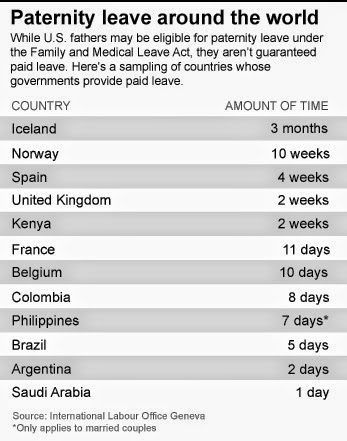California in 2002 and became the first state to guarantee six weeks of paid leave for mothers and fathers. 62 countries, other than the United States, require paid paternity leave. Russia, Rwanda, Cambodia? Even Guatemala requires it. But not the U.S.
"We're so indoctrinated that work is our life -- we really struggle with that," says Randell Turner, Ph.D., vice president of the National Fatherhood Initiative (www.fatherhood.org), a non-profit group dedicated to promoting the importance of fathers.
When a sports player had the audacity to miss a couple games to be with his wife during child birth, and the child after, he was ridiculed mercilessly. It because quite evident that much of our society felt a game was much more important than the well being of wife and child, was certainly more important than the chance to bond with a child. Get back you to work!
The Family and Medical Leave Act (FMLA) allows parents and other caretakers to take up to 12 weeks unpaid, job-protected leave if they work at a company with 50 or more employees. A large number of workers aren't covered under this act, since only about half of U.S. workers are employed by a company of 50 or more people. According to the National Partnership for Women & Families, only 22 percent of employees who are eligible for leave under the FMLA take it, mainly because most can't afford the loss of income
In certain conditions, employees or employers may choose to substitute accrued paid leave (such as sick or vacation leave) to cover some or all of the FMLA leave. However, an employee is not guaranteed this-- paid leave is determined by the terms and conditions of the employer's normal leave policy. Therefore, some employers have the right to prohibit men from converting accrued paid sick leave to paternity leave.
Timberland is one of only a handful of companies offering paid paternity-leave. IBM and Microsoft also give dads two weeks; Merrill Lynch, the insurance giant, offers one week.
"The trend is in the right direction but still very small," says Professor Malin, who has tracked paternity leave policies and practices since the 1980s. His research shows that ongoing "workplace hostility" at many companies still prevents men from actually using the benefit.
"It must be paid and it must be supported at the top," he says. "If men believe (the leave policy) shouldn't be used or 'there goes my career,' they won't take it."
~http://life.familyeducation.com/working-parents/fathers-day/36483.html#ixzz3Buo3vf5J
So, if you're lucky enough to work for a large enough company, and you're lucky enough to have scratched together a little money, then you can take some time off to be with your brand new child. If not, get back to work. How many employers would tell that to a new mother? Hey, congrats on popping out the bambino, now get back at it. And that is assuming that you haven't been convinced by society and your coworkers that you're somehow less of a man if you do take the time off.
And what of the "low income" fathers who can barely afford to pay the bills? They certainly can't afford time off to bond with their child. And this all assuming that their exists a healthy relationship between both parents. That isn't always true. How is a father to bond with his child if not allowed to see them until after the court demands it, or until after the paternity test comes back? We have the option to blame, to ridicule, to second guess the parents, or we can help the father. We can take the time and effort to remind the father of every bad choice he's made, or we help him.
And even if you are lucky enough to work for a company with paid leave, or you work for the federal government, a state or local government, or any company that has 50 or more employees working within 75 miles of your workplace. AND you've worked for your employer for at least 12 months and for at least 1,250 hours during the previous year (which comes out to 25 hours per week for 500 weeks) then, and only then you qualify for 12 weeks UNPAID family leave under the Family and Medical Leave Act.
Of course there are catches even then. Because we all know that work, profit, money and the well being of our employers is far more important than that of children. You can be legally denied this leave if you're in the highest paid 10 percent of wage earners at your company and they can show that your absence would cause substantial economic harm to the organization. If you and your partner both work for the same company you're only entitled to a combined 12 weeks of parental leave between the two of you. Not true if you work for two different companies. The dollar is far more important to our culture than the family. And we wonder why there are so many issues.


No comments:
Post a Comment